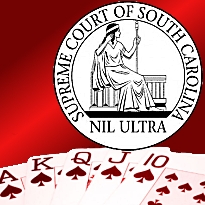 After two years of deliberation, the South Carolina Supreme Court has reinstated the convictions of five men who were found playing poker in a private home near Charleston way back in 2006. The five were arrested along with 20 other individuals who’d gathered at the house to indulge their poker perversion, during which their hosts charged a nominal rake they claimed was meant solely to keep the players supplied with food and drink (the small amount of marijuana found at the scene was presumably not on the menu). But the organizers’ fees and promotion of the game via social networking sites allowed the police to charge those present for violating a “gambling house” statute dating back to 1802 that criminalizes “play … in any house used as a place of gaming … any game with cards.”
After two years of deliberation, the South Carolina Supreme Court has reinstated the convictions of five men who were found playing poker in a private home near Charleston way back in 2006. The five were arrested along with 20 other individuals who’d gathered at the house to indulge their poker perversion, during which their hosts charged a nominal rake they claimed was meant solely to keep the players supplied with food and drink (the small amount of marijuana found at the scene was presumably not on the menu). But the organizers’ fees and promotion of the game via social networking sites allowed the police to charge those present for violating a “gambling house” statute dating back to 1802 that criminalizes “play … in any house used as a place of gaming … any game with cards.”
The five men in question challenged their tickets in court and lost. That decision was subsequently overturned by Circuit Court Judge Markley Dennis, who ruled that the law in question only applied to games of chance, whereas he determined poker to be a game of skill. The town of Mount Pleasant, in which the den of poker iniquity was located, objected to Dennis’ ruling, taking the matter to the state Supreme Court in 2010. On Wednesday, the justices ruled against the players by a 3-2 margin.
In announcing their decision, the Supreme Court justices who voted to reinstate the convictions acknowledged the ‘poker is a game of skill’ argument, then dismissed it as immaterial because their reading of the statute meant gambling on skill games is illegal if done in a prohibited location. The concurring justices determined that a private home did indeed qualify under the statute’s definition of a “house used as a place of gaming,” especially since its owner was hosting games twice a week and advertising them online.
While poker advocates will likely seize upon the justices’ acknowledgement of poker’s skill component, the fact remains that a really vague law remains on South Carolina’s books, which – depending on the whims of a police officer or prosecutor – could still be applied to cash games involving friends gathering at somebody’s home. There have been efforts by the state Senate to introduce some clarity into the law, but these amendments have died on the order paper without ever coming up for a final vote. May we suggest a New Year’s resolution, gentlemen?